
GRI index
EVVA has been reporting to GRI since 2011The Global Reporting Initiative (GRI, globalreporting.org) is a global standard for transparent and internationally comparable sustainability reports.
- Reporting period: 2022 (many figures for 2023 will only be available from the end of 2024).
The data on energy and emissions will be submitted later in March/April 2024
- GRI Universal Standards: This EVVA sustainability report was prepared in accordance with GRI Universal Standards (GRI 1: Foundation 2021)
- GRI Sector Standards: None of the existing GRI Sector Standards is applicable to EVVA
- GRI Topic Standards: All topics defined as material are available under Our Projects and are specified, and marked as such, in this GRI index. You can also find further information and activities at EVVA for a host of Topic Standards that have not been defined as material
All 7 GRI requirements for reporting “in accordance” are met.
Requirement 1: Apply the reporting principles
Accuracy, balance, clarity, comparability, completeness, sustainability context, timeliness, verifiability. All of these GRI principles serve as guidelines for reporting. EVVA has:
- defined the key issues with the greatest impacts in internal sustainability workshops and in the cross-stakeholder materiality analysis
- fully analysed these key issues with management approaches and targets
- provided detailed data and/or realistic estimates
- also dealt with negative aspects in line with more balanced communication
- placed a strong emphasis on clear, comprehensible reporting. Interested parties can access the topics that are important to them with just 1–2 clicks
- provided data from several years and a list of all targets – in chronological order on request – to ensure comparability
- used reliable and verifiable data and analyses for each reporting period
Requirement 2: Publication of the GRI 2 disclosures
See GRI 2 in this index
Requirement 3: Determine material topics
See GRI 3 in this index and materiality analysis. GRI Sector Standards: none of the existing GRI Sector Standards is applicable.
Requirement 4: Publication of the GRI 3 disclosures
See GRI 3 in this index
Requirement 5: Publication of the material topics
See the following points according to GRI 3 as well as the topics under Our projects
Requirement 6: Reasons for omitted disclosures
If points specified by GRI have not been disclosed, this is noted in the relevant point with a justification.
Requirement 7: Publication of own GRI content index
See this entire navigation item “GRI index”
Requirement 8: Statement of use of GRI
See first point “GRI – Statement of use” in this index
Requirement 9: Notify GRI
EVVA informed GRI and sent the link to the sustainability report by email.
2–1 Organisational details
a. EVVA Sicherheitstechnologie GmbH is a leading manufacturer of mechatronic access solutions.
b. EVVA is a family-owned business. Ownership: 90% Nicole Ehrlich-Adám, 10% Stefan Ehrlich-Adám
c. The headquarters have been located in Vienna since the company was founded in 1919. Address of headquarters: Wienerbergstrasse 59-65, 1120 Vienna, Austria
d. Global subsidiaries and distributors at https://www.evva.com/int-en/aboutus/contact/international/
2–2 Organisational entities included in the report
a. The present sustainability report mainly includes the Vienna headquarters because this is where EVVA’s main production facility is located and where around 75% of the production value creation and around 80% of the total value creation is generated. All manufacturing of blanks and the production of all EVVA electronic access systems is carried out at the EVVA headquarters, as well as the production of large customer orders for the subsidiaries. EVVA is planning to include the two other production sites in Krefeld (Germany) and Tišnov (Czech Republic) in the upcoming updates. The other locations are European sales subsidiaries that can carry out assembly activities, but have no or very few machines.
b. The Group management report relates to the EVVA Group as a whole, while the sustainability report mainly relates to the Vienna headquarters.
c. As previously mentioned, this report update includes the headquarters, not the subsidiaries. However, successes in sustainability at the headquarters have a direct impact on the subsidiaries. For example, Clean Production developments at the headquarters, which are applied to the two other production sites in Krefeld and Tišnov or the new EVVA digital learning platform, which was first tested in Austria and Switzerland and then rolled out in the other EVVA subsidiaries one year later.
2–3 Reporting period, frequency and contact points
a. The reporting period for this sustainability report is 2022. It is published annually.
b. The financial group management report is published annually.
c. Sustainability report publication date: January/February 2024 for 2022 reporting period
d. Contact point for questions about the sustainability report:
- Martin Mayrhofer and Anna Vavken, Internal Communication (coordination and preparation of sustainability report), m.mayrhofer(at)evva.com; a.vavken(at)evva.com
- Martin van Berkum, Head of Production mechanics, Operations & Quality Management, m.vanberkum(at)evva.com. Specialist in environmental sustainability in production
- Nicole Ehrlich-Adám, Managing Director, Human Resources & Organisational Development Group Division Executive, n.ehrlich(at)evva.com
2–4 Changes in reporting
a. EVVA has previously reported in accordance with GRI standards 2016. With the update from the 2021 period, we are reporting in accordance with the new GRI Universal Standards 2021 with the necessary additional information. In addition, the status of the sustainability targets has been updated and the content has been adjusted for the reporting period accordingly (data, texts, illustrations, etc.). You can find changes in the definition of the material topics here in the index under 3-1.
From the 2022 report update, EVVA has prepared a CO2 analysis for all three scopes internally and no longer commissioned an external analysis. The internal analysis is based on a newly established data management system that provides even more accurate figures and fewer estimates than in previous reporting years.
The input-output analyses prior to 2022 for "electricity" and "gas" did not yet cover all parts of the headquarters building. The lists in the report are therefore available from 2022 onwards to enable correct comparability with future years.
2-5 External assurance
a. and b. No external assurance was performed, since this is not a requirement of GRI reporting. denkstatt (denkstatt.eu), an independent consultancy firm for sustainability provided EVVA with important assistance and recommendations for reporting in accordance with the GRI Universal Standards and the future EU standards in workshops during 2022. Management and the Group Division Executive for Operations & Quality Management, i.e. the top management level, took part in these workshops. Hauska & Partner (www.hauska.com) provided input for the design of the 2020 materiality analysis.
2–6 Activities, value chain and other business relationships
a. EVVA Sicherheitstechnologie GmbH operates in the metalworking industry.
b. Value chain. EVVA is a European manufacturer of mechatronic access solutions.
- The product portfolio is always available on the EVVA website at www.evva.com
- The markets served at https://www.evva.com/int-en/aboutus/contact/international/
- The sectors for our products at https://www.evva.com/int-en/solutions/
- Information on our value chain can be found in this report at https://www.evva.com/at-de/ueber-uns/nachhaltigkeitsbericht/warum-nachhaltigkeit/unsere-strategie/
- EVVA works with around 400 suppliers (for the main production facility in Vienna) to manufacture high-quality mechanical and electronic access systems. The majority of suppliers cover our material requirements (mainly brass) for manufacturing and for tools and machines. More information on our suppliers (breakdown by region, security of supply, etc.) can be found under Our Projects
- Our customers are: Trade partners/private customers, general contractors/property developers, companies, architects/designers. They are served by our own EVVA subsidiaries or by our global distributors. You can find subsidiaries and distributors at https://www.evva.com/int-en/aboutus/contact/international/ More information can be found in this report under Customer satisfaction, Promoting the regional economy and Stakeholders
c. EVVA maintains other business relationships with numerous research organisations and cooperation partners. Find out more under Cooperations and partnerships as well as under Stakeholders.
d. There have been significant changes compared to the previous year’s report in the definition of some material topics – more information can be found here in the GRI index under 3-1. The calculation of the electricity and gas values for the headquarters now also includes parts of the building that were not included in previous calculations.
2–7 Employees
a. to d. Information on the number, employment relationship and breakdown by gender under Employee satisfaction. The information relates to the number of employees and to the reporting date of 31 December 2022. In accordance with the regulation in the Working Hours Act, all positions at EVVA have a stipulated minimum number of working hours.
e. EVVA’s staff turnover rate is traditionally low and for this reporting period, it is well below the average. See also information under Employee satisfaction
2–8 Workers who are not employees
a. to c. EVVA employed 16 temporary employees in 2022 (11 in Research & Development, 5 in Production). This figure has remained virtually unchanged from 2021. Apprentices are considered permanent employees at EVVA. In 2021, 48 holiday interns were employed at EVVA and in 2022 46.
2–9 Governance structure and composition
a. EVVA’s top management team is composed of
- the senior management team, Stefan Ehrlich-Adám and Nicole Ehrlich-Adám, both of whom are EVVA owners and who run the company independently
- and the Group Division Executives for Sales & Marketing, Finance, Digital Services, Market Innovation & Technology, Operations & Quality Management as well as the Human Resources & Organisational Development staff unit
b. The top management team addresses the impact of the organisation and its respective Group divisions on the economy, the environment and people. Responsible corporate governance considers economic, environmental and social impacts in all decisions. Sustainability management is directly anchored in EVVA’s senior management team, and thus, at the highest decision-making level.
c.
- Gender breakdown of the top management team: Nicole Ehrlich-Adám is a member of the top management team and, as the owner, forms the top independent decision-making body together with Stefan Ehrlich-Adám
- EVVA CEO Stefan Ehrlich-Adám is Deputy Chairman of the Professional Association of the Metalworking Industry (FMTI) in the Austrian Federal Economic Chamber and is particularly committed to the topics of industry, sustainability and education in his role. He also undertakes activities on the executive board of the Federation of Austrian Industry (IV) Vienna, is Head of the Committee for Labour and Social Affairs IV and also Vice-President of the Austrian Standard Institute
- All members of this governing body have the skills that are crucial for their area of responsibility, are appointed for an indefinite period and take into account the interests of stakeholders, such as their employees and customers, in their position
- Management aims to ensure that the divisional goals are strongly linked to the company’s sustainability goals in order to further increase the leverage of our sustainable conduct and further strengthen the commitment of all employees. Everyone – not just those entrusted with implementing the goals – should feel committed to sustainability in the company
2–10 Nomination and selection of the highest governance body
a. and b. The management of the EVVA family business is performed directly by owners Stefan and Nicole Ehrlich-Adám. The other four Group Division Executives were chosen exclusively on the basis of professional and social competence. Decisions are taken independently and without influence from other companies or interest groups.
2–11 Chair of the highest governance body
a. and b. Stefan Ehrlich-Adám is CEO, and thus, EVVA’s highest governance body. Together with Nicole Ehrlich-Adám, he is the owner of the company. He also heads the Sales & Marketing division, which he has been building up and expanding for decades through his comprehensive expertise with electronic and mechanical products and his communication skills (fluent in several languages).
2.12
a. Activities of the highest governance body with regard to vision, mission statement, values, strategy, etc.
The top management team has strongly aligned EVVA’s culture with sustainable conduct. It developed the vision, mission statement, values and code of conduct in collaboration with an internal strategy team and an external consultancy firm. They are the pillars of our sustainable strategy and materiality analysis.
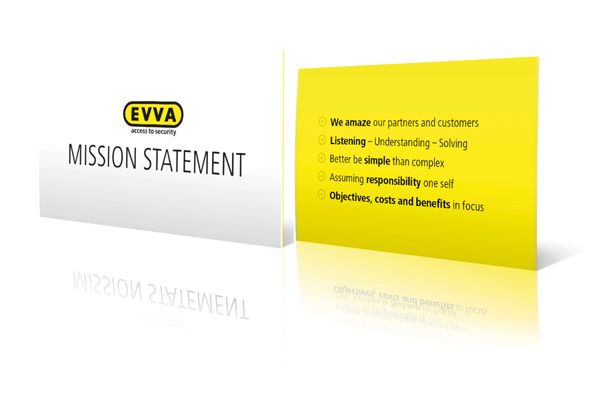
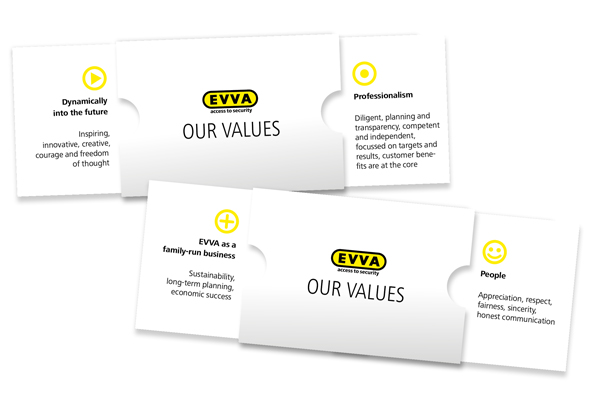
b. Duties of the highest governance body with regard to due diligence and impacts
EVVA’s management fulfils its due diligence obligations with a consistent precautionary approach and an ongoing risk analysis in order to prevent possible harm to the economy, environment and health. The risk analysis – coordinated by the "Quality Management" division for the entire company – has been included in this report's materiality analysis. It identifies hazards for the company and describes and assesses them, for example, according to probability of occurrence. This produces mandatory measures that are implemented by those responsible. In addition to management, all employees at the departmental management level and higher, as well as external stakeholders who communicate hazards to EVVA, are included in the risk analysis.
- For a comprehensive list of tools and methods we use to get feedback from our stakeholders, see Stakeholders
- Management was actively involved throughout the entire process of conducting the materiality analysis with stakeholders in 2020. You can find it under Materiality analysis
- How EVVA determined the material topics is described in detail in the GRI index under the corresponding point 3–1
- You can find detailed information about the material topics under Our projects
c. Activities of the highest governance body with regard to reviewing sustainable processes
- The materiality analysis determines the particularly relevant sustainability topics for EVVA.
- Management and the core sustainability team – together with the person responsible for the respective topic – define the measurable targets for each material topic. The departments responsible implement the measures for this independently.
- Starting from the top management, the sustainability goals are brought into the divisions of the company. Sustainability is part of all sub-strategies. The focus is on risk and impact assessments, defining sustainable directions – for example, to reduce energy and emissions –, the development of new business models and the development of our EVVA culture and organisation. Sustainability is a central aspect of the agenda – and not a “product of chance”.
> Strategic integration: in the annual strategy workshops and strategy days
> Operative integration: in the monthly reports of the extended senior management team (senior management and Group Division Executives)
"Each of our strategies is assessed for current - and possible future - sustainability aspects. This applies, for example, to innovations, product development, production methods and much more", emphasise Stefan and Nicole Ehrlich-Adám, managing directors and owners of EVVA. Concrete examples of management decision-making: If new machines are purchased, they must be clean-production-capable; potential and implementation analyses for photovoltaic systems on roofs must always be carried out for new EVVA sites or building extensions; existing and new processes are assessed for digitisation potential, etc.
- The EVVA Sustainability Board invites to status quo meetings to evaluate the progress of all targets. Owner and Managing Director Nicole Ehrlich-Adám is part of this team and is therefore directly and personally involved. Where are things going well? Where are things not going so well and why? Every EVVA manager always has the goals on their radar.
- The sustainability team has clearly documented each goal status on the "Our targets" page of this digital report. All goals – including those from previous years – are recorded and can be tracked here.
- New goals will be derived from the upcoming materiality analyses and will be set by EVVA during the year.
2–13 Delegation of responsibility for managing impacts
a. and b. You can find out how management analyses the impacts on the economy, environment and people and delegates the responsibilities for this under 2–12 above, especially under point c.
2–14 Activities of the highest governance body with regard to sustainability reporting
a. and b. The top management level, owner Nicole Ehrlich-Adám, reviews and approves the EVVA sustainability report. She is a member of the Sustainability Board, has worked on the materiality analysis and was actively involved in the preparation of the report. The figures in the report come from reliable internal and external sources, such as the externally audited EVVA environmental reports, input-output analyses or the CO2checks for EVVA carried out by sustainability consultants.
You can read more about the monitoring of our sustainability goals in 2–12, point c.
2-15 Conflicts of interest
No conflicts of interest are present or known.
EVVA CEO Stefan Ehrlich-Adám is Deputy Chairman of the Professional Association of the Metalworking Industry (FMTI) in the Austrian Federal Economic Chamber and is particularly committed to the topics of industry, sustainability and education in his role. He also demonstrates this commitment through his activities on the executive board of the Federation of Austrian Industry (IV) Vienna, as Head of the Committee for Labour and Social Affairs IV and as Vice-President of the Austrian Standard Institute.
2–16 Communication of critical impacts
a. Impacts by EVVA that could be critical, for example, for stakeholders (inside-out) or impacts on EVVA that can be critical for business development (outside-in) are communicated to the top management level via:
Internal:
- Supervisory board
- Economic forecasts from the Market Innovation & Technology division
- Risk analysis
- Strategy teams
- Meetings with the Group Division Executives and subsidiary heads
- Divisional workshops
- Core sustainability team, status meetings on sustainability goals
- Trend radar
- Info breakfasts/info cafés with employees
- Information from employees at other internal events or on social media
- “EVVA Compliance Line” – whistleblower tool for employees
External:
- Expert committees at the European level, such as the ARGE (Working Group for Locks and Escutcheons)
- National trade associations
- Membership of the Federation of Austrian Industry (IV) and the Chamber of Commerce and Industry (WKO)
- Networks for innovation, sustainability and other specialist topics (e.g. Sustainability Circle, INNOX, etc.)
- Stakeholder exchange
- Sales events and visits to partner companies and customers
- EVVA test systems
- Collaborations with other companies
- Associations, interest groups
- Company competitions
- All stakeholder dialogues under Stakeholders
b. Critical issues that were reported to top management during the reporting period:
Topics that were reported to top management and which they dealt with more intensively were primarily due to the difficult international economic developments. The high wage costs, which are discussed in annual collective bargaining, are also a challenge. EVVA CEO Stefan Ehrlich-Adám is part of the employer team. After long discussions, a consensus was reached in negotiations with the Austrian union representatives also in December 2023.
- Rising energy prices (see Energy and emissions overview for more information)
- Rising material prices (for more information, see Recycling and resources overview and Security of supply)
- Provisions for supply bottlenecks (more details under Security of supply)
- Materials containing lead and possible impacts on production (see Recycling and resources overview for more information)
- Labour shortage in the market (more details under Employee satisfaction and Top Apprenticing company)
2–17 Sustainability expertise of the top governance body
a. Sustainability itself is one of the most important issues of our time, especially in the EU in the wake of the Green Deal. It is essential that the management teams stay abreast of innovations and developments. At EVVA, this happens via several channels:
- External consultation:
EVVA and the sustainability consultancy firm, "denkstatt", have been working together for years. denkstatt supports EVVA with analyses, such as for our CO2 footprint, and presents further developments to management, for example, the new reporting standards (CSRD/ESRS, EU taxonomy, etc.), including implementation proposals
- Dialogue formats:
EVVA is a member of sustainability initiatives such as respACT and the Sustainable Circle, where a wide range of sustainability issues in the value chain are brought up and discussed. EVVA’s top management level takes part in events, webinars, etc.
- Internal exchange:
The top management level exchanges views on current and material topics in regular status reports for the sustainability goals and the strategy and group division meetings, which take place several times a year. Sustainability is a fixed item on the agenda
2–18 Assessment of the highest governance body
a. to c. The status of all our sustainability goals is discussed and documented on a regular basis to ensure these are achieved. The entire top management level is present at these status meetings. So far, EVVA has achieved most of the stated goals in the forecast period. The performance of the top management level as they manage and oversee the impact management – i.e. EVVA’s impact on the economy, the environment and people – is not evaluated.
2–19 Remuneration
a. The EVVA headquarters is subject to the collective agreement of the metalworking industry. The EVVA remuneration policy includes fixed and variable remuneration, such as one-off bonuses.
b. A variable portion of remuneration may be tied to impact management objectives and performance.
2–20 Determination of compensation for employees
a. and b. Collective bargaining takes place every autumn between the trade union representatives of the employees and the employer representatives within the framework of social partnership. A consensus has been reached with the trade unions every year. The outcomes of these wage negotiations are published nationwide in the media, such as radio, print media, etc. and published by the associations.
2–21 Annual total compensation ratio
Confidentiality restrictions and the protection of personal data apply to this point.
2–22 Statement from management
See Why sustainability > statement CEO
2–23 Sustainable policies and commitments
a. to c. EVVA is a leading security company and is known for maximum reliability, of course, in abiding by laws as well. There were no penalties or violations during this reporting period.
- Our principles, such as being for human rights and against corruption, are laid down in our Code of Conduct and are also reflected in our corporate values
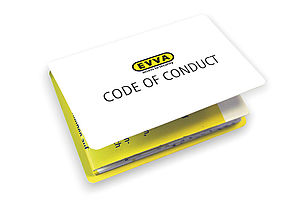
- Human rights: EVVA attaches great importance to the “Guiding Principles on Business and Human Rights” of the United Nations and to respect for human rights throughout the entire corporate group
- Environment: EVVA has defined clear guiding principles for its environmental policy:
> Economise on raw materials and energy
> Avoid emissions and waste as much as possible
> View waste as potentially recyclable
> Raise environmental awareness through information and dialogue with all employees
- Due diligence and precautionary approach: EVVA identifies and assesses the impacts on the economy, the environment and people.
> The risk analysis – coordinated by the "Quality Management" division for the entire company – has been included in this report's materiality analysis. You can find out more about risk analysis here in the GRI index under 2–12 b.
> EVVA is committed to the United Nations “Rio Declaration on Environment and Development”. The company follows this precautionary approach to prevent any type of environmental damage. Examples of precautionary measures include our oil-free clean production, our waste water treatment plant or our double-bottomed washing systems with a built-in protection mechanism in case of cracks (which, however, has never had to be activated because our systems are regularly maintained)
> Legal database software automatically informs EVVA about changes in legislation and new legal requirements (e.g. regarding occupational safety). It is managed in the “Quality Management” division and transferred to those responsible in the company
- Occupational safety: Protecting staff plays a very important role in a manufacturing company. EVVA has taken extensive precautions to keep workplace accidents at a very low level. More information can be found under Occupational safety and health protection. EVVA is committed to the principles of the ILO (International Labour Organization), such as occupational safety, freedom of association, non-discrimination, etc.
- Stakeholders: Our responsible actions include all our stakeholders. The vast majority of EVVA’s suppliers are located in Europe; we procure only a very small number of components from other continents. Read more about the risk of legal violations and child labour in the supply chain under Supplier sustainability. More about our regionality with Proportion of regional suppliers
- Crisis management: EVVA has developed crisis plans and internal emergency lists, which quickly provide employees with precise instructions in emergencies, such as fire, injuries, accidents, etc. They are available printed out at highly visible locations around the company and, of course, also digitally on the intranet
- Compliance policies. For details, see Compliance
d. to f. The guidelines and commitments were mostly initiated directly by the EVVA management and were fully approved in all cases. They apply to the entire international EVVA Group and are communicated to all employees. The Code of Conduct also applies to our suppliers.
2–24 Embedding in the company
a. The points described in 2–23 are firmly established in the organisation, considered in the materiality analysis and are carried into the company by management, the respective managers and our Legal Office. All processes for this are listed here in the report under Compliance, Occupational safety and health protection, Supplier sustainability and Strategy.
2–25 Processes to report and remediate negative impacts
a. to d. According to the GRI, this disclosure relates to the use of grievance procedures and other formats with which stakeholders can flag negative impacts and their remediation. At EVVA, such procedures include:
With employees:
- Info breakfasts/info café events, which take place several times a year at all locations, where grievances or information can be communicated directly to management – either by the employees themselves or by table spokespersons
- The MOGs, the annual employee orientation talks with managers, are also specifically designed for grievances and improvements
- In-house WOW! suggestions for improvement system. Here, every colleague can indicate problems or negative impacts and suggest suitable solutions. The “Quality and Process Management” division collects all WOW! suggestions (more under Permanent innovation)
- EPOS (EVVA’s Production Optimised System) is an optimisation initiative dedicated to manufacturing and production employees. In their EPOS teams, they can flag negative impacts and make their own suggestions for improvement
- Quantitatively anonymous employee surveys (conducted by HR) where grievances can also be reported
- Ongoing internal risk analysis that includes negative impacts and grievances from stakeholders
- Internal whistleblower tool “EVVA Compliance Line” (see Compliance)
With customers, cooperation partners:
- EVVA is in constant contact with customers and Partners, such as locksmiths or specialist security shops, who report grievances directly to EVVA (e.g. via the sales team, technical support using the ticket system, etc.)
- Large quantitative (anonymous upon request) business partner surveys in which grievances or inadequate processes can also be reported
- In addition, the EVVA “Quality and Process Management” division regularly conducts telephone (non-anonymous) satisfaction surveys with business partners during the year, in which negative impacts can be addressed
- Joint innovation processes with customers to pre-empt possible market problems
With politicians/unions:
- EVVA CEO Stefan Ehrlich-Adám is an active member of the organisation representing employers in collective bargaining negotiations for the Austrian metalworking industry. These take place every autumn with the union representatives of the employees. The trade unions’ grievances, demands and requests regarding remuneration are addressed directly to him and the employer team and discussed very intensively. A consensus has been reached with the trade unions every year
e. Stakeholder concerns are documented and forwarded to the relevant employees at EVVA. They review the implementation. Reports with potentially large negative impacts are handled at the level of the Group Division Executives and management, and implementations are determined in strategy workshops and sustainability target meetings, etc.
Examples are complaints about workplace ergonomics that were made by employees and resolved by EVVA. Another example is detailed documentation of administrative and technical errors/grievances via a ticket system – more on this under Quality.
2–26 Advisory and reporting platforms
a. EVVA offers stakeholders internal and external opportunities to seek advice on responsible conduct and to report grievances. For example:
- Internal consultation and training by the EVVA Legal Office, for example, to raise awareness of the risk of corruption or data protection breaches. The Legal Office is also the central and confidential body for reporting grievances or possible legal violations in the company
- The “EVVA Compliance Line” is a digital whistleblower tool that allows employees to flag incidents or raise concerns anonymously at any time. For more information, see Compliance
- Employees can attend external events on sustainability topics, such as digitalisation, the circular economy, reporting, etc. (e.g. via CSR days, webinars, workshops, etc.) This is done through our cooperation partners, such as respACT and Business Circle (more on this under Cooperations and partnerships) or in-house with external service providers
- The core sustainability team at EVVA is available to answer any questions or provide assistance to all employees
- Special company tours and discussion sessions on the topic of sustainability for school classes (more under Sustainability starts at school)
- Golden events and other events for business partners
- For more exchange platforms, see previous point 2–25
2–27 Compliance
a. to d. There have been no criminal proceedings against the company, EVVA complies with all laws. For more information, see Compliance.
2–28 Memberships
a. EVVA CEO Stefan Ehrlich-Adám is Deputy Chairman of the Professional Association of the Metalworking Industry (FMTI) in the Austrian Federal Economic Chamber. He also undertakes activities on the executive board of the Federation of Austrian Industry (IV) Vienna, is Head of the Committee for Labour and Social Affairs IV and Vice-President of the Austrian Standard Institute.
EVVA is represented in these associations and interest groups:
- Association of the Metaltechnology Industries (FMTI)
- ÖVQ (Austrian Association for Quality Assurance)
- ÖQA (Austrian Society for the Promotion of Quality)
- VSÖ (Association of Austrian Security Companies)
- Federation of Austrian Industries
- ARGE (Association of European Lock and Escutcheon Manufacturers)
- Agenda Austria
You can find out more about our collaborations under Cooperations and partnerships.
2–29 Approach to stakeholder engagement
a. All details can be found under Stakeholders – as well as in relation to the formulation of material topics under Materiality analysis and here in the GRI index under 2–12 and 2-13.
2-30 Collective bargaining agreements
a. and b. The collective agreements for the Association of the Metaltechnology Industries apply to all employees at the EVVA headquarters, i.e. 100%, and also to temporary employees. EVVA CEO Stefan Ehrlich-Adám is an active member of the organisation representing employers in collective bargaining negotiations. These take place every autumn with the union representatives of the employees. A consensus has been reached with the trade unions every year.
3-1 Determination of material topics
a. and b. Our materiality analysis from 2020 has proven to be reliable in the last two years of global crises (coronavirus, supply chain difficulties, security of supply, higher material and energy prices), as EVVA had already previously defined energy, materials and the number of regional suppliers as material topics with corresponding sustainability goals. The analysis already has a strong impact weighting, which is particularly important in the new GRI Universal Standards. The resulting material topics also have the highest impact values, even if only the impact axis and not the relevance axis is used. EVVA has therefore retained the materiality analysis in this report update (see also point 37 "Do organizations need to redo their materiality assessment?" in the FAQs of the GRI Universal Standards 2021).
However, EVVA has newly defined two topics as “material”: emissions/climate neutrality and security of supply. For more information, see Materiality analysis. The respective challenges are addressed in the individual material topics under Our projects.
This is how EVVA developed the materiality analysis:
1) Sources
The sources for our topics and the basis of our materiality analysis are primarily:
- the GRI topics (overview of all GRI topics at www.globalreporting.org)
- our EVVA culture, i.e. EVVA’s vision, mission statement, values and Code of Conduct (for more information, see Strategy and here in the GRI index under 2-12 a.)
- feedback and evaluations from our stakeholders (e.g. from satisfaction surveys, various dialogue channels and personal discussions)
- decisions of the strategy team and sustainability board; discussions with sustainability partners
- the unique aspects and challenges in the industry and in product development
- our value chain (see Strategy)
- risk analysis. It documents the risks for EVVA. The procedures and results of the risk analysis are evaluated by management, quality and process management as well as other EVVA managers
- Competitor analysis
- Targets from previous EVVA sustainability reports
- The SDG: The United Nations has set 17 ambitious goals for sustainable development in our world: the Sustainable Development Object Goals (SDG). EVVA is aligned with the SDGs and has been implementing many of these goals for years – and we continue to work on them. You can see the corresponding SDG pictogram in the presentation of EVVA’s sustainable projects. It indicates which UN SDG target we are making a positive contribution towards with our actions and how we are helping to meet that target. More about the SDGs at https://sdgs.un.org/
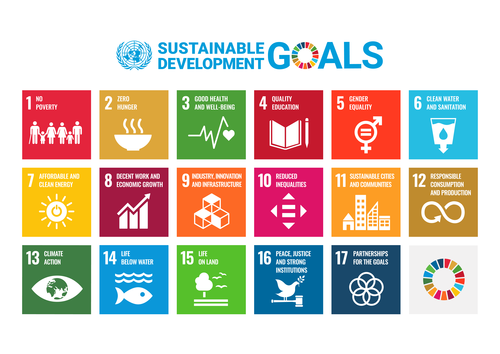
2) Dialogues and surveys
a) Identification of the core topics:
The Sustainability Board, in which management is also represented, reviewed the sources and established 23 sustainable EVVA core topics in eight metacategories. Stakeholders were able to add additional topics to this list in the following discussion sessions and surveys.
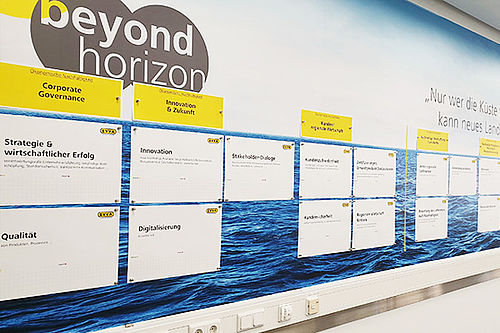
b) Qualitative stakeholder dialogue:
In the subsequent half-day stakeholder dialogue at the Vienna headquarters, the topics were presented in detail, discussed in two dialogue groups and then evaluated individually. Namely
> according to impact, i.e. EVVA’s impact on the economy, environment and society as well as
> according to influence/relevance in their decision about EVVA.
In addition to management, the interest groups that are very important to EVVA – employees, trade partners, suppliers and research institutes – were present as stakeholders. In the selection of the 16 participants, commitment and a high level of interest in sustainability were particularly important to us to ensure a professional and insightful dialogue. The participating employees came from a wide range of EVVA divisions: Management, Production, Human Resources/Internal Communications, Marketing, Research & Development, Quality Management, Digital Services, Logistics and Product Management/Sales.
For the evaluation, we did not choose the usual scale from 1 to 5, where it would have been easy to assign a high number to everything. The participants were expected to really engage with every topic in an in-depth and personal way. Therefore, for the 23 topics, everyone had only 15 points for the impact question and 15 points for the relevance question, which could be distributed as deemed appropriate. This limitation proved to be highly recommendable; each stakeholder had to carefully consider which sustainable aspects were most important for EVVA.
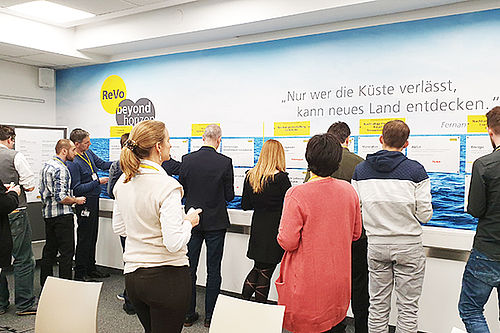
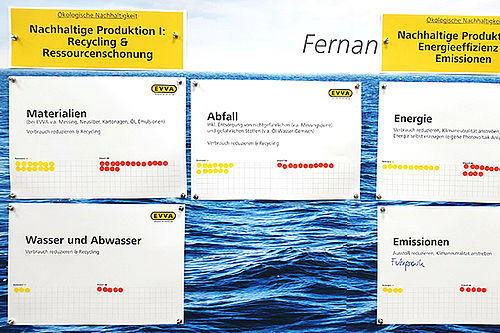
c) Quantitative employee survey:
A the same time, employees in the headquarters were able to evaluate the 23 topics according to the criterion of decision-making relevance in an online survey. The impact question, which calls for intensive discussion, was not asked in this quantitative survey.
The aim of the employee survey was
- to allow employees to play an active role in shaping the materiality decision
- and to find out whether the relevance results of the employee survey are similar to those of the qualitative stakeholder dialogue.
86% (397 people) of employees took part in the voluntary survey. This is an extraordinarily high participation rate and shows how interested our employees are in sustainability. You can find the results of the survey under Materiality analysis.
EVVA would like to conduct these stakeholder sustainability dialogues and surveys at regular intervals. Important trends and new market requirements are emerging, previous views and ways of thinking are changing – which is why we want to remain in constant dialogue with our stakeholders.
Materiality matrix
The topic matrix is shown under Materiality analysis. This is where you can also find out how EVVA conducted the prioritisation.
3–2 List of material topics
a. All material topics are listed and marked yellow under Our projects and described in detail. You can find a visualisation under Materiality analysis.
b. For changes in the materiality analysis, see above point 3–1, first paragraph
3–3 Management of material topics
a to f. The material topics and their impacts are described in the respective topic blocks under Our projects (and marked as material). Regarding c. “Commitments and guidelines”, see also point 2–23 in this GRI index.
You can find an overview of all EVVA sustainability goals under Our targets.
More information under Corporate Governance/Strategy & Economic success
Key EVVA topic: Management approach and targets relating to the proportion of regional suppliers.
Interesting information on the topic can also be found under Security of supply
For more information, see Compliance
For more information, see Compliance
All taxes are processed in compliance with the law via EVVA's "Finance" division. More under Compliance.
Key EVVA topic: Management approach and targets under
• Recycling & Resources overview
• Recycling materials
• Clean Production
Key EVVA topic: Management approach and targets under
• Energy & Emissions overview
• Central building control technology
• Compressed air system optimisation
• Photovoltaics
• LED changeover
Interesting information on this topic, also under Permanent innovation
For more information, see Recycling water/waste water
For more information, see Recycling water/waste water and EVVA Bees
Find out more at
More information under Waste
More information under Supplier sustainability
Key EVVA topic employee satisfaction:
Management approach and targets under Employee satisfaction
Further EVVA activities and guidelines on this topic can be found under
> Occupational safety & health protection,
> here in the GRI Index under 2-23 and 2-30
> and on compliance with social standards and human rights under Compliance and Supplier sustainability
Key EVVA topic employee satisfaction:
Management approach and targets under Employee satisfaction.
More on collective agreements here in the GRI Index under 2-30.
Minimum notification periods are not included in the collective agreements, but employees are informed of all operational changes immediately and in a timely manner through various communication channels.
For more information, see Occupational safety & health protection
More information at EVVA Academy
More information under Employee satisfaction
For more information, visit
• Compliance
• Supplier sustainability
For more information, visit
• Compliance
• Supplier sustainability
For more information, visit
• Compliance
• Supplier sustainability
For more information, visit
• Compliance
• Supplier sustainability
More information under Supplier sustainability
More information under
• Promoting regional economy
• Customer satisfaction
• Cooperation and partnerships
• möwe child protection
• Proportion of regional suppliers
• Compliance
More information under Supplier sustainability
More information under Compliance
EVVA CEO Stefan Ehrlich-Adám is Head of the "Industry" division of the Vienna Chamber of Commerce and is particularly committed to the topics of industry, sustainability and education. He is also a board member of the Federation of Austrian Industry (IV), Head of the Committee for Labour and Social Affairs IV and also Vice-President of the Austrian Standard Institute.
For more information, visit
• Compliance
• Quality
• Certifications & Awards
For more information, see Compliance
For more information, see Data Protection

 AT
AT
 DE
DE
 DE
DE
 UK
UK
 INT
INT
How would you like to share?